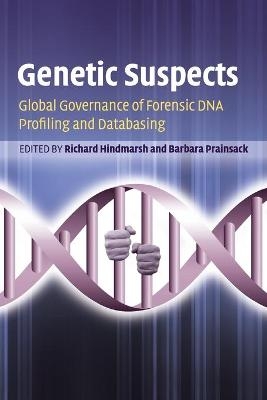
Genetic Suspects
Cambridge University Press (Verlag)
978-1-108-82907-6 (ISBN)
As DNA forensic profiling and databasing become established as key technologies in the toolbox of the forensic sciences, their expanding use raises important issues that promise to touch everyone's lives. In an authoritative global investigation of a diverse range of countries, including those at the forefront of these technologies' development and use, this book identifies and provides critical reflection upon the many issues of privacy; distributive justice; DNA information system ownership; biosurveillance; function creep; the reliability of collection, storage and analysis of DNA profiles; the possibility of transferring medical DNA information to forensics databases; and democratic involvement and transparency in governance, an emergent key theme. This book is timely and significant in providing the essential background and discussion of the ethical, legal and societal dimensions for academics, practitioners, public interest and criminal justice organisations, and students of the life sciences, law, politics, and sociology.
Richard Hindmarsh is Associate Professor at Griffith School of Environment, and Centre for Governance and Public Policy, Griffith University, Australia. He specialises in co-produced sociotechnical systems analysis informed by science, technology and society (STS) studies; governance and regulation studies; environmental policy; and the politics and sociology of green biotechnology and forensic DNA technologies. Professor Hindmarsh is also an international expert reviewer for both the Australian Research Council and the UK Economic and Social Research Council and invited International Advisory Board member of the (US) Council for Responsible Genetics. Currently, as its co-founder, he is further establishing the Asia-Pacific STS Network, a new regional research community spanning Australasia, East and SE Asia and Oceania, as its convenor for 2010–2011. Barbara Prainsack is Senior Lecturer at the Centre for Biomedicine and Society (CBAS) at King's College London, UK. A political scientist by training, her research focuses on how politics, bioscience, religion and 'culture' mutually shape each other, and how they interact with how we understand ourselves as human beings, persons, and citizens. Her research on regulatory and societal aspects of human cloning, stem cell research, and DNA testing (both medical and forensic) has featured in national and international media such as BBC News, ABC National Radio (Australia), and Die Zeit. She is a member of the Editorial Advisory Boards of Science as Culture and Personalized Medicine, and a member of the National Bioethics Commission in Austria.
List of contributors; About the contributors; Foreword Sheila Jasanoff; Acknowledgments; 1. Introducing Genetic Suspects Richard Hindmarsh and Barbara Prainsack; Part I. Key Areas in DNA Profiling and Databasing: 2. Key issues in DNA profiling and databasing: implications for governance Barbara Prainsack; 3. Forensic utilization of voluntarily collected DNA samples: law enforcement versus human rights Elazar Zadok, Gali Ben-Or and Gabriela Fisman; 4. Base assumptions? Racial aspects of US DNA forensics Harriet A. Washington; 5. Health and wealth, law and order: banking DNA against disease and crime Richard Tutton and Mairi Levitt; 6. DNA profiling versus fingerprint evidence: more of the same? Simon A. Cole and Michael Lynch; Part II. National Contexts of Forensic DNA Technologies and Key Issues: 7. DNA databases and the forensic imaginary Robin Williams; 8. Partners in crime: on the use of forensic DNA technologies in Austria Barbara Prainsack; 9. Inquisitorial forensic DNA profiling in the Netherlands and the expansion of the forensic genetic body Victor Toom; 10. DNA - the Nor-way: black boxing the evidence and monopolising the key Johanne Yttri Dahl; 11. Portuguese forensic DNA database: political enthusiasm, public trust and probable issues in future practice Helena Machado and Susana Silva; 12. On trial! Governing forensic DNA technologies in the United States Jay D. Aronson; 13. Biosurveillance and biocivic concerns, from 'truth' to 'trust': the Australian forensic DNA terrain Richard Hindmarsh; 14. Finding the balance: forensic DNA profiling in New Zealand Johanna S. Veth and Gerald Midgley; 15. Forensic DNA profiling and databasing: the Philippines experience Maria Corazon De Ungria and Jose Manguera Jose; 16. Conclusion: beyond borders - trends and challenges in global forensic profiling and databasing Barbara Prainsack and Richard Hindmarsh; Index.
| Erscheinungsdatum | 06.07.2020 |
|---|---|
| Zusatzinfo | Worked examples or Exercises; 4 Tables, black and white; 2 Line drawings, black and white |
| Verlagsort | Cambridge |
| Sprache | englisch |
| Maße | 153 x 230 mm |
| Gewicht | 500 g |
| Themenwelt | Naturwissenschaften ► Biologie |
| Recht / Steuern ► EU / Internationales Recht | |
| Recht / Steuern ► Privatrecht / Bürgerliches Recht ► Medizinrecht | |
| Sozialwissenschaften ► Soziologie | |
| ISBN-10 | 1-108-82907-4 / 1108829074 |
| ISBN-13 | 978-1-108-82907-6 / 9781108829076 |
| Zustand | Neuware |
| Haben Sie eine Frage zum Produkt? |
aus dem Bereich


